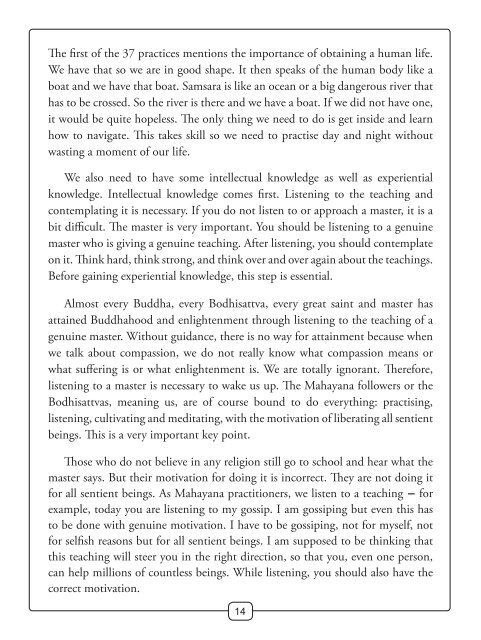Gyalsey_Laglen_v2_24092014_e-book
Gyalsey_Laglen_v2_24092014_e-book
Gyalsey_Laglen_v2_24092014_e-book
You also want an ePaper? Increase the reach of your titles
YUMPU automatically turns print PDFs into web optimized ePapers that Google loves.
The first of the 37 practices mentions the importance of obtaining a human life.<br />
We have that so we are in good shape. It then speaks of the human body like a<br />
boat and we have that boat. Samsara is like an ocean or a big dangerous river that<br />
has to be crossed. So the river is there and we have a boat. If we did not have one,<br />
it would be quite hopeless. The only thing we need to do is get inside and learn<br />
how to navigate. This takes skill so we need to practise day and night without<br />
wasting a moment of our life.<br />
We also need to have some intellectual knowledge as well as experiential<br />
knowledge. Intellectual knowledge comes first. Listening to the teaching and<br />
contemplating it is necessary. If you do not listen to or approach a master, it is a<br />
bit difficult. The master is very important. You should be listening to a genuine<br />
master who is giving a genuine teaching. After listening, you should contemplate<br />
on it. Think hard, think strong, and think over and over again about the teachings.<br />
Before gaining experiential knowledge, this step is essential.<br />
Almost every Buddha, every Bodhisattva, every great saint and master has<br />
attained Buddhahood and enlightenment through listening to the teaching of a<br />
genuine master. Without guidance, there is no way for attainment because when<br />
we talk about compassion, we do not really know what compassion means or<br />
what suffering is or what enlightenment is. We are totally ignorant. Therefore,<br />
listening to a master is necessary to wake us up. The Mahayana followers or the<br />
Bodhisattvas, meaning us, are of course bound to do everything: practising,<br />
listening, cultivating and meditating, with the motivation of liberating all sentient<br />
beings. This is a very important key point.<br />
Those who do not believe in any religion still go to school and hear what the<br />
master says. But their motivation for doing it is incorrect. They are not doing it<br />
for all sentient beings. As Mahayana practitioners, we listen to a teaching - for<br />
example, today you are listening to my gossip. I am gossiping but even this has<br />
to be done with genuine motivation. I have to be gossiping, not for myself, not<br />
for selfish reasons but for all sentient beings. I am supposed to be thinking that<br />
this teaching will steer you in the right direction, so that you, even one person,<br />
can help millions of countless beings. While listening, you should also have the<br />
correct motivation.<br />
14


